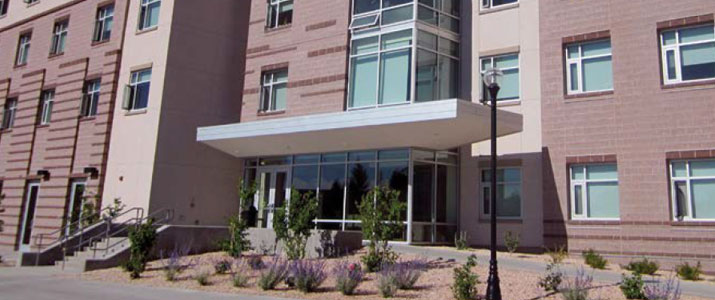
Focus on Campus
The state of current affairs includes better access control
- By April Noblitt
- Nov 01, 2013
 Located in Colorado’s San Luis Valley, 220 miles south of Denver, Adams
State was founded in 1923 as a state teachers’ college and has
since grown into a liberal arts institution that encompasses 54 buildings
on its 90 acre campus. Offering bachelor’s degrees in 16 majors
with 28 minors and emphasizing 8 master’s degree programs, enrollment
includes approximately 2,500 students on campus and more than 10,000 in
extended studies.
Located in Colorado’s San Luis Valley, 220 miles south of Denver, Adams
State was founded in 1923 as a state teachers’ college and has
since grown into a liberal arts institution that encompasses 54 buildings
on its 90 acre campus. Offering bachelor’s degrees in 16 majors
with 28 minors and emphasizing 8 master’s degree programs, enrollment
includes approximately 2,500 students on campus and more than 10,000 in
extended studies.
A bill signed into law in May 2012 granted it full university status.
As part of a continuing effort to improve security for its students, Adams State
University is upgrading its access control system with new electronic locks that are
easy to reconfigure as requirements change. The majority of the current upgrades
are focused on campus residence buildings, but the program also includes some
academic facilities, such as those with laboratories that offer 24-hour access.
A Growing University
For the past several years, most of the residence buildings have been secured with
computer-managed Schlage CL Campus Locks, which are offline locks with user
access rights stored in the user’s magnetic strip credentials. Because they are battery
powered, they require no wiring and are easy to install in existing buildings.
Audit trails and other data from the offline locks are downloaded to a handheld
device and then uploaded into the system.
Campus growth, however, led a search for an access control system that could
manage an expanding volume of data and adapt more readily to future needs. At
the same time, new technology became available that offered the ability to change
lock configurations easily and upgrade quickly to accommodate evolving trends
in credentials.
To meet their requirements, Adams State University selected Schlage AD-250
locks, which perform the same function as the CL locks. While both have the user
access rights stored on the user’s card, the modular design of the AD-Series locks
makes it easy to change configurations or upgrade credentials, networking options
or software without replacing the locks, since they are designed to be changed by
simply replacing a module.
Upgrades in Process
Mostly AD-Series locks are being installed in new buildings and retrofitted as existing
residence halls are renovated.
“We were renovating two wings at
Coronado Hall a few years ago,” said
Locksmith Don Connell. “We didn’t
find out about the AD locks until we
had completed the first wing, but we put
them into the second wing renovation.”
Other upgrades have followed. Connell
believes the flexibility of handling
future requirements makes the investment
in the new locks worthwhile.
“Technology moves quickly,” Connell
said. “The minute you buy a laptop
and walk out the door, it starts to be obsolete,
so we’ll get our money’s worth if
we can keep up as technology changes.”
He also pointed out that the cost of
replacing entire locks goes beyond the
cost of the hardware itself and includes
factors such as labor. By simply changing
a module, costs are reduced.
Installation of the new locks continues
to be work in progress. Exterior
doors on all residence halls already
have been equipped, along with interior
doors on several of the 12 residence facilities.
Connell said that eventually all
electronically-controlled openings will
be upgraded.
An added benefit of the new locks,
Connell mentioned, is that they are
easier to repair.
“We had someone shove a movie
ticket into a reader,” he noted. “Before,
I would have had to take the whole lock
off. With the AD lock, all I did was remove
a couple of screws and replace the
reader, test it and it was good to go.”
Although most of the new locks
are being installed in existing and new
residence buildings, they also are being
incorporated into other areas. Two
buildings that were converted include
first-floor areas with a computer laboratory
that is available around the clock;
however, access to the rest of the building
had to be restricted at certain times.
“We have Von Duprin AD993 exit
trim on the exterior doors and stairwell
doors,” Connell said. “They are
dogged down to allow access during
the day but accessible only with an authorized
student card at other times.
This allows students to gain access to
the building for the lab but not the second
or third floors.”
Recently, AD-Series locks were also
added to McDaniel Hall, while a card
reader on the hall’s elevator provides
similar control of allowing limited access.
Mechanical keys are used primarily
for overrides on electronic locks where
needed, but Connell restricts their usage
to maintain security. Connell is the
only one with the master key, and the
housing office for each building has an
override key for that building.
According to Connell, the university
is considering upgrading the existing,
standalone, offline locks to a wireless
system within the next few years. This
will avoid the need to hardwire existing
buildings while providing online control
and feedback.
This article originally appeared in the November 2013 issue of Security Today.